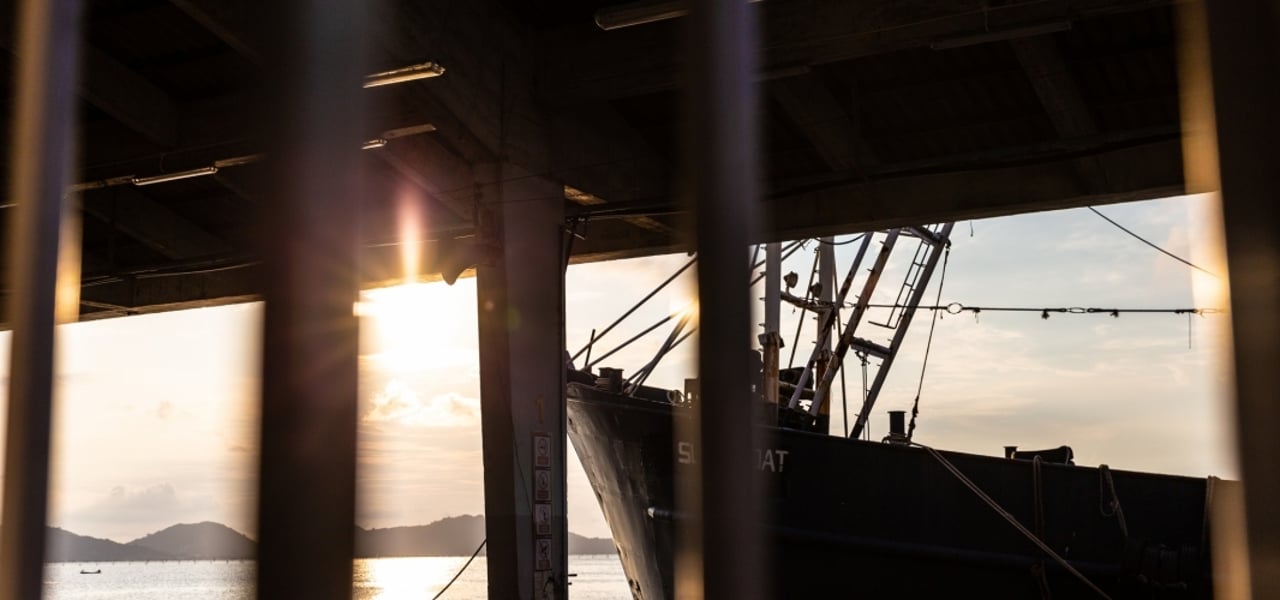Justice for Burmese Trafficking Victims as Husband and Wife Plead Guilty

BANGKOK, THAILAND—On Tuesday, a Bangkok criminal court sentenced two Burmese traffickers to 18 years in prison. The verdict came just two weeks after the couple pleaded guilty to trafficking a Burmese family of 12, including five children, from their home in Myanmar to fishing ports in Southern Thailand.
IJM supported Thai authorities and our partners to investigate the case, leading to the arrest of the husband and wife on 28 August 2018. After their arrest, the couple was denied bail and has been in jail as the trial progressed. This is the first case of labour trafficking that IJM has supported in Thailand to result in convictions.
False Promises and Swelling Debt
Working with a broker based in Myanmar, the traffickers had lured the family to Thailand with promises of well-paying jobs on fishing boats and in port cities. But when they arrived on the coast of Southern Thailand, the men in the family were forced to work as fishermen and held in debt bondage, receiving only a fraction of their promised salary. Two young girls were forced to work inside the perpetrators’ home as domestic maids, and another young woman was forced at knifepoint to marry one of the perpetrators’ workers.
The family lived under constant threats of violence and brutal working conditions, and their debt continued to mount. Finally, in late 2017, the victims contacted the Issara Institute’s hotline for help. They were referred to the Migrant Workers Rights Network (MWRN) and to the Human Rights and Development Foundation (HRDF), who coordinated with the Thai Department of Special Investigation (DSI) to intervene. This network of partners secured the urgent rescue of the victims and arrest of the husband and wife in August 2018.
IJM Thailand has been supporting the case during the DSI investigation and in the months leading up to the verdict. Along with HRDF, IJM’s lawyers have supported the prosecution against the Burmese couple. Our aftercare team, working closely with Save the Children, has worked to assess the survivors’ needs, provide care and prepare them to testify in court.
Exploitation in the Shadows of Thailand’s Massive Fishing Industry
In the last decade, international headlines have pointed to the rampant exploitation, abuse and human trafficking embedded in Thailand’s vast fishing industry. Men from surrounding nations—impoverished, uneducated and migrating for work—are vulnerable to being trafficked across borders into Thailand.
Traffickers often use false promises, threats and illegal debt to trap vulnerable labourers into work. In a 2016 study, IJM worked with the Issara Institute to survey Burmese and Cambodian fishermen and confirmed that trafficking of migrant fishermen on Thai fishing boats is widespread, with common patterns of abuse.
More than a third had been trafficked in the five years prior to the survey.
Nearly a third had witnessed a crewmate’s abuse at sea, and one in seven were physically abused themselves. A stunning 76.2% accrued debt prior to even beginning work.
And it’s not just men who are targeted—following last summer’s arrests in this case, Sansana Kaewtuptim, Deputy Director of the Bureau of Anti-Trafficking Crime in Thailand’s Department of Special Investigation, shared,
"Sometimes we see, as we did with this case, that it’s not just one migrant worker who is targeted – but also their whole family. We might see the brokers control the money the family should receive for items, possessions, and hold them in debt bondage…[this is] human trafficking.”
In Thailand, prosecutions of cases of forced labour trafficking on Thai fishing boats are rare—and convictions are even more uncommon. In 2017, the last year in which Thai government data is available, only 2% of trafficking prosecutions in Thailand were in cases of forced labour on fishing boats. And when trafficking cases are successfully prosecuted, the sentences tend to be low: 33% of trafficking convictions resulted in sentences over 10 years in 2017.
The strength of the penalties in this case—36 years imprisonment, reduced by half to 18 years by the guilty plea—is a significant sign of forward momentum.
Returning Home
The survivors are participating in IJM’s aftercare program and have been living in the protective care of the government since their rescue. After assessing their most critical needs, IJM and our partners are working to provide the care they need to move forward in freedom and stay safe from revictimisation.
Five of the survivors chose to boldly testify in the trial against their traffickers. Now that the trial has concluded, we will support their return to their home in Myanmar.
This news has also been shared by the Human Rights and Development Foundation on their website.
See our news story on the arrest of the perpetrators in 2018.